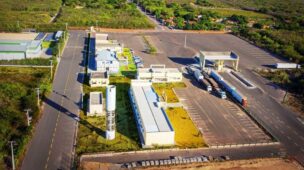Tempo de leitura: 1 minuto
The Democratic Republic of Congo plans to establish special economic zones for companies that manufacture goods from the country’s minerals, President Joseph Kabila said. “There is a need to create special economic zones for the final users of Congolese natural resources,” Kabila said at a conference Wednesday in the southeastern city of Kolwezi. The area will allow producers of electric vehicles, smartphones and other goods to “install themselves in the DRC,” he said.
Congo is the world’s biggest source of cobalt, which is used to make rechargeable batteries in electric cars manufactured by companies including Volkswagen AG. The country also produces more than a quarter of the world’s tantalum, used in Apple iPhones and other smartphones.
Congo’s cobalt currently undergoes a first stage of processing in the country into concentrate or hydroxide, before being exported abroad, mainly to China, where it is transformed into the products required by battery makers.
The zones are being created to enable industries to transform raw materials into finished products, Evariste Mabi Mulumba, president of the Senate’s economy and finance commission, said at the conference. Congo must “emphasize economic diversification and must commit ourselves resolutely to the process of industrialization,” he said.
Mines Minster Martin Kabwelulu, who spoke earlier at the conference, also reiterated that the government won’t brook any opposition to an amended mining code it began implementing in June. The regulations introduced new taxes and increased royalty payments, drawing criticism from miners including Glencore Plc, Randgold Resources Ltd. and China Molybdenum Co., which have threatened to sue to protect their investments.
Nobody, whether a company, civil society group or government, should “attempt to question this text governing the mining sector,” Kabwelulu said. “All that I would allow myself to say is to invite the different stakeholders, each following his own position, to commit themselves to implementing the measures of the revised mining law.”






Os comentários foram encerrados, mas trackbacks e pingbacks estão abertos.